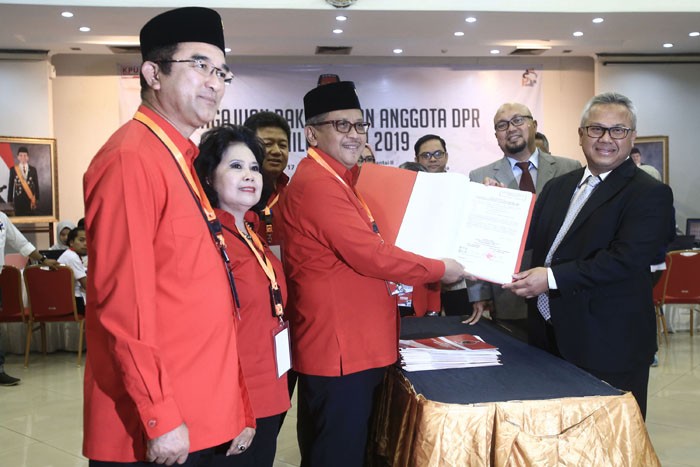Popular Reads
Top Results
Can't find what you're looking for?
View all search resultsPopular Reads
Top Results
Can't find what you're looking for?
View all search resultsMany legislative candidates still enigmas as election day approaches
The Association for Elections and Democracy (Perludem) has found that 25.5% or 2,049 of the registered House of Representatives candidates have opted not to disclose their personal information to the public through the General Elections Commission (KPU) website.
Change text size
Gift Premium Articles
to Anyone
Nearly 8,000 candidates are running for 575 seats at the House of Representatives and tens of thousands are running for 19,817 seats at provincial, regency or city-level legislative councils (DPRD).
The simultaneous nature of this year's elections mean the legislative elections have been overshadowed by the hubbub surrounding the presidential race. But even voters who actively seek information have little to go by.
The Association for Elections and Democracy (Perludem) found that 25.5% or 2,049 of the registered House candidates, opted not to disclose their personal information to the public through the General Elections Commission (KPU) website.
"Many of the legislative candidates' profiles, visions and missions, as we as their programs are not available on the KPU's official website," Perludem executive director Titi Anggraini said recently. "This hurts the spirit of freedom of information for the public and the transparency of the 2019 general elections."
She added that Perludem recommended voters only pick candidates that had made their profiles accessible.
"What can we expect from a candidate that does not want to publish their resume?" she said.
However, the Indonesian Justice and Unity Party (PKPI), one of the parties that Perludem found to have the highest number of candidates with unavailable information, said it was merely a technical error.
"Our party's policy is to give as much detailed information as possible and communicate our backgrounds to as many people as possible," PKPI secretary-general Verry Surya Hendrawan, whose own data was marked as unavailable on the website, told The Jakarta Post on Sunday. "We will evaluate the problem and try to rectify it."
But even candidates who have made their information public have listed very broad or vague goals and programs, most only saying that they wanted to help their parties to victory or "bring prosperity to Indonesia."
Some candidates, however, have sought to be more explicit and detailed about what they wanted to achieve if voted into office, particularly nonincumbents and those running for the first time.
Indonesian Solidarity Party (PSI) candidate Dedek Prayudi, for example, listed his motivation as "helping Indonesia take advantage of the demographic bonus that will peak in 2035."
A former demographics and population researcher, Dedek also aimed to get into House Commission IX, which oversees health care and employment.
“As newcomers, we must be very intense. I went to several areas in my electoral districts, the most remote ones. I went there and they were surprisingly excited that a fresh legislative candidate came to meet them,” he said recently.
Golkar Party legislative candidate Christina Aryani, who is running in the second Jakarta electoral district, also said there was not enough substantive information about many legislative candidates.
To rectify this, Christina created a fold-out business card that displayed her social media profiles (Facebook and Instagram), the four issues she is focused on (women's rights, migrant worker protection, the Indonesian diaspora and the young generation) as well as a brief resume.
"So far the response has been positive," she told the Post on Monday.
Titi said that besides the individual candidates, parties also should be better at communicating what programs they would work toward if they won in the election. "This is one of the weakest points in the legislative elections," she said. "In the future, there should be a debate for party representatives, not only presidential candidates.
Meanwhile, activists from NGOs have tried to remedy the lack of data by providing more information, such as which candidates have graft convictions on their records.
Perludem also encouraged voters to take a closer look at women, disabled and indigenous candidates, while the Indigenous Peoples Alliance of the Archipelago (AMAN) has its own coterie of "AMAN envoys" who have a single clear mission of creating legislation to recognize indigenous peoples.
"We have 157 candidates from 16 parties in both national and local legislative elections," AMAN secretary-general Rukka Somboliggi told the Post on Sunday. "Despite the lack of spotlight on the legislative races, we are focused on getting our candidates elected, so that whoever the president is, indigenous peoples will be recognized and protected."










